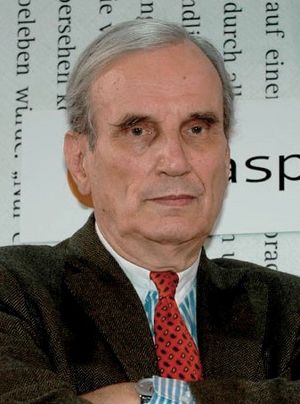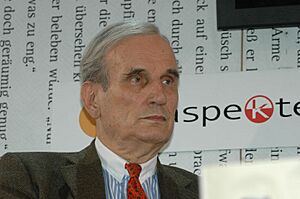Joachim Fest facts for kids
Quick facts for kids
Joachim Fest
|
|
|---|---|

(2004)
|
|
| Born |
Joachim Clemens Fest
8 December 1926 Berlin, Germany
|
| Died | 11 September 2006 (aged 79) Kronberg im Taunus, Germany
|
| Occupation | Historian |
| Known for | Writings and commentary on Adolf Hitler and Nazi Germany |
Joachim Clemens Fest (born December 8, 1926 – died September 11, 2006) was a German historian and writer. He was well-known for his books and comments about Nazi Germany. He wrote a famous book about Adolf Hitler and other books about important figures like Albert Speer. Fest was an important voice in discussions among German historians about the Nazi era. His writings were sometimes praised and sometimes strongly criticized.
Contents
Early Life and Education
Joachim Fest was born in Karlshorst, a part of Berlin, Germany. His father, Johannes Fest, was a Roman Catholic schoolteacher who strongly opposed the Nazis. When the Nazis came to power in 1933, his father lost his job.
In 1936, when Joachim was 10, his family refused to let him join the Hitler Youth. This was a youth group that became compulsory for German children in 1939. Not joining could have caused serious trouble for his family. Joachim was later kicked out of his school. He then went to a Catholic boarding school in Freiburg im Breisgau. This helped him avoid joining the Hitler Youth until he was 18.
In December 1944, when he turned 18, Fest joined the Wehrmacht, which was the German army. He did this mainly to avoid being forced into the Waffen-SS, a special army group. His father did not want him to join any part of the army. He said it was "Hitler's difficult war." Joachim's time in the Second World War was short. He gave up in France. After the war, he studied many subjects. These included law, history, and art history. He studied at universities in Freiburg im Breisgau, Frankfurt am Main, and Berlin.
Starting a Career in Media
After finishing his studies, Joachim Fest began working for a radio station in Berlin. It was called RIAS (Radio in the American Sector) and was run by Americans. From 1954 to 1961, he was an editor focusing on modern history. He created radio programs about important historical figures. These included leaders of the Nazi regime like Heinrich Himmler and Joseph Goebbels. These programs were later turned into his first book. It was called The Face of the Third Reich: Portraits of the Nazi Leadership.
In 1961, Fest became the chief editor for television at Norddeutscher Rundfunk (NDR). This was a broadcasting service in North Germany. He was also in charge of a political TV show called Panorama.
Writing About History
Joachim Fest then started working on his biography of Adolf Hitler. This book was published in 1973. It was the first major book about Hitler by a German writer since 1952. The book came out when younger Germans were thinking a lot about the Nazi period.
Fest's book caused some debate among German historians. He believed that Hitler's rise to power was not mainly due to economic problems. Instead, he thought it was because millions of Germans either ignored Hitler or actively supported him.
Fest explained Hitler's success by talking about a "great fear" among German middle classes. This fear came from the First World War and fast changes in society. Many people longed for a simpler past. This led to anger towards other groups, especially Jewish people. They were seen as symbols of modern changes. This made many Germans open to someone like Hitler. Fest wrote that Hitler "was never only their leader, he was always their voice... the people, as if electrified, recognised themselves in him."
In 1977, Fest directed a documentary film called Hitler: A Career. The film tried to explain why ordinary people in Germany admired Hitler. Some critics, like American historian Deborah Lipstadt, did not like the film. They said it showed too many clips of Hitler from propaganda films. They also felt it ignored the Holocaust, which made it seem like it was praising a terrible person.
Fest also helped Albert Speer, who was Hitler's architect and later a minister. Speer was writing his autobiography, Inside the Third Reich (1970). After Speer died, there were questions about how truthful his memories were. Fest then wrote Speer: The Final Verdict (2002). In this book, Fest criticized Speer. He said Speer was involved in the Nazi regime's crimes. Speer had hidden this involvement well during the Nuremberg Trials.
Another important book by Fest was Plotting Hitler's Death: The German Resistance to Hitler (1994). He wrote it for the 50th anniversary of the 20 July plot to kill Hitler. In this book, Fest changed his mind a little about the German people. He admitted that many Germans had opposed the Nazi regime. However, he still believed that most Germans chose not to accept the truth about Nazism until it was too late.
In 2002, Fest published Inside Hitler's Bunker: The Last Days of the Third Reich. This book used new information from Soviet archives. It mostly agreed with the story of Hitler's death told in Hugh Trevor-Roper's book The Last Days of Hitler (1947). Inside Hitler's Bunker, along with the memories of Hitler's secretary Traudl Junge, was used for the 2004 German film Der Untergang (Downfall). This was one of the first German films after the war to show Hitler directly.
Journalism and Criticism
After writing the Hitler biography, Fest became a co-editor of the Frankfurter Allgemeine Zeitung. This is one of Germany's leading newspapers. From 1973 to 1993, he edited the culture section of the paper.
Fest's views were generally traditional and often showed doubt. He was especially critical of left-wing ideas. These ideas were common in German intellectual life from the late 1960s until 1991. He played a big part in the Historikerstreit (historians' dispute) from 1986 to 1989. In this debate, he sided with those who disagreed with what they saw as too much left-wing influence in German history writing.
Personal Life
Joachim Fest was married and had two sons and a daughter. All his children also worked in publishing or media. He passed away at his home in Kronberg im Taunus in 2006. This was the same year his autobiography, Not Me: Memoirs of a German Childhood, was published.
The main title of his autobiography came from something that happened when he was a child. When he was ten, he and his brother were called to their father's study. Their father had just been fired from his job as a headmaster. Fest's father asked his sons to write down and remember a saying from the Gospel of Matthew: Etiam si omnes – ego non. This means "Even if all others [do] – not I."
Works
In German
- Das Gesicht des Dritten Reiches: Porträt einer totalitären Herrschaft, R. Piper & Co. Verlag, 1963, München.
- Speer: Eine Biographie, Fischer TB Verlag, 2001, Frankfurt am Main (ISBN: 3-596-15093-0)
- Ich nicht: Erinnerungen an eine Kindheit und Jugend, Rowohlt Verlag, 2006–09, Reinbek (ISBN: 3-498-05305-1)
- Hitler: Eine Biographie, Spiegel-Verlag, 2006–07, Hamburg (ISBN: 978-3-87763-031-0)
- Nach dem Scheitern der Utopien: Gesammelte Essays zu Politik und Geschichte, Rowohlt Verlag, 2007–09, Reinbek (ISBN: 978-3-498-02119-1)
- Flüchtige Größe. Gesammelte Essays über Literatur und Kunst, Rowohlt Verlag, 2008, Reinbek (ISBN: 978-3-498-02123-8)
In English
- Hitler (ISBN: 0-15-602754-2), 1973. Published in English 1974.
- "Encumbered Remembrance: The Controversy about the Incomparability of National-Socialist Mass Crimes", pages 63–71 & "Postscript, April 21, 1987", pages 264–265 from Forever In The Shadow of Hitler? Edited by Ernst Piper, Humanities Press, Atlantic Highlands, New Jersey, 1993, (ISBN: 0-391-03784-6).
- Inside Hitler's Bunker: The Last Days of the Third Reich (ISBN: 0-374-13577-0)
- Speer: The Final Verdict (ISBN: 0-15-100556-7)
- Plotting Hitler's Death: The German Resistance to Hitler, 1933-1945 (ISBN: 0-8050-5648-3)
- Not Me: Memoirs of a German Childhood, trans. Martin Chalmers, Atlantic 2012 (ISBN: 978-1-84354-931-4)
See also
 In Spanish: Joachim Fest para niños
In Spanish: Joachim Fest para niños
- List of Adolf Hitler books


